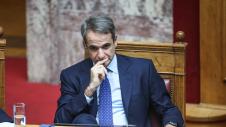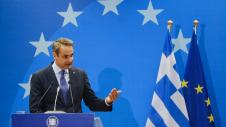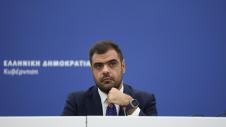The Greek government aims to relief society from the consequences of the pandemic crisis and keep the country on a growth course, Prime Minister Kyriakos Mitsotakis said at the beginning of his policy speech at the Thessaloniki Helexpo Forum on Saturday.
"It is undoubtedly an unprecedented event. The pandemic did not allow the operation of the 85th International Fair. This time there were not the usual business meetings, or the parallel events," the Premier said, adding that the image of today's speech, with only 50 participants wearing masks, keeping distances, was a measure for the particular conditions around us.
"I will present the broader government strategy for the coming period," he said, adding that his presence in Thessaloniki was to honor the city and Northern Greece and to present, with realism, the consequences of the coronavirus pandemic on the society and the economy and to speak about the challenges of the country's national policy in the Eastern Mediterranean. Mitsotakis said his priority was to present the steady steps the country will take in an unstable environment in the autumn and the coming winter, "because nothing in the world will be the same as yesterday."
"Besides the agony and insecurity, there rises a new self-confidence, a new national optimism, that the state and citizens together will make it, and exit this adventure stronger," he said. "The crisis hit the entire planet," he said, adding that the government also had to deal with the intensified migration flows. "It is true that in the months that passed there was much turbulence. But that's why I am here, to deal with the difficulties. To send a message that we can make it all together".
"The government plan, specialists' instructions and the responsibility shown by citizens have made us leaders in the defense against the virus," the Prime Minister said, adding that even when the economy restarted the country properly managed the new wave of the pandemic. He added, however, that "as a double health crisis seizes the planet again, our country continues to manage the national front as well, since Ankara adds to the challenges in the Aegean, by undermining peace throughout the Mediterranean. It threatens the borders of Europe and undermines security in a crucial cross-road of three continents. Against threats and slogans, Greece responds with logic and arguments."
Mitsotakis noted that the other side of our strength is efficient diplomacy, adding that we have proven we have many and strong allies. "That's why I insist that only the epilogue of provocation can become the prologue of talks."
The Greek PM said that because of the dimensions of the pandemic's crisis, every long-term combination could remain in the balance and every policy announcement unfulfilled. He added, however, that this autumn and winter hide both traps and opportunities, that's why they demanded not only long-term plans but immediate short-term measures as well. "There is no vision for tomorrow unless today is served with consistency," Mitsotakis said, adding: "Nor economic recovery without social ascension. The programme of our actions has one slogan: self-confidence".
The PM noted that in the previous years the country's defense sector was in conditions of disinvestment. "The time has come for a balance between needs and capabilities. Time to strengthen our armed forces for the security of the country, but also as the top obligation to Greeks who will carry the burden. It is the price for our position in the map".
He announced six emblematic decisions to "multiply the strength, operation and efficiency of Greek armed forces":
First, the air force will immediately be strengthened with a squadron of 18 Rafale fighter aircraft which will replace older Mirage aircraft. These are 4th generation aircraft. A move strengthening our defense power which, combined with the modernized F-16 aircraft and other aircraft, together make a force not to be ignored by anyone.
Second, the navy begins procedures to include in its fleet 4 new multiple task frigates and to upgrade 4 MEKO frigates currently operating. These new vessels will be accompanied by four navy ROMEO helicopters, making our seas more fortified than ever.
Third, the armed forces weaponry will be enriched with new anti-tank weapons, new heavy type torpedoes and guided missiles.
Fourth, the armed forces will be renewed with the addition of 15,000 men and women with a five-year term. The whole framework of military service and education will be re-assessed.
Fifth, we activate our defense industry. US funds are investing on the modernization of Elefsis shipyards, a strategic investor is expected soon in the Skaramanga shipyards, the completion of the privatization of Hellenic Vehicle Industry is due and Hellenic Aerospace Industry is reorganized.
Sixth, the armed forces will strengthen their digital operation to deal with any hybrid-type cyber-attacks.
These are six brave choices. Six bold answers not only to meet current needs, but also the challenges of history."
The Greek PM announced 12 initiatives for the economy. "The pandemic is not hitting public health only but national economy as well, and the government has responded with a package of measures implemented last spring and enriched constantly, depending on arisingneeds. These new 12 initiatives aim to protect employment and productive activity as long as the pandemic crisis remains. And to support the income of the weaker. These are 12 steps of confidence, creating a road map for the coming months and 2021, so that the economy remains standing tall as a precondition for growth. Four of these initiative support labor, three liquidity for enterprises and investments and another five incomes of the weak and of the middle class which has suffered for several years. I will say it again, they are the backbone of Greek society". These initiatives are:
- Lowering social insurance contributions for both employers and workers in the private sector by three percentage points (from 39.7 pct to 36.7 pct) in 2021, a move designed to boost households' income and to facilitate new hirings.
- Abolishing a solidarity contribution for workers in the private sector, professionals and farmers. This measure will be valid, initially, for one year in 2021.
- Implementing immediately an innovative programme to offer state subsidies to 100,000 new job positions. The state will cover for six months all contributions for employers and workers on the condition that the company will not reduce its workforce.
- Strengthening and expanding a "Syn-Ergasia" programme by the end of 2020, covering lost wages for those who work fewer hours due to the pandemic.
- A programme offering state loans to enterprises, worth 1.5 billion euros, begins immediately and another round, the fourth, is expected to begin in November worth 600 million euros.
- Offering tax cuts for digital and green fixed-capital investments for a period of three years (2021-2023).
- Repayment of around 1.4 billion euros to pensioners in retrospective pension payments for the period 2015-2016 and disbursing another 460 million euros to pensioners by December as part of a new method of calculating pensions.
- Immediate abolition of a special property tax for the country's 26 smallest islands.
- Extending until April 2021 a suspension of payment of tax and social insurance obligations to all workers and professions hit by the pandemic crisis.
- Expanding for another six months a lower VAT rate for transport, coffee, beverage, cinemas and tourist services.
- In cooperation with the banking system, the primary residence of vulnerable households will be excluded from auctions until the end of 2020.
- Extending all unemployment benefits mfor another two months.
These measures will support the Greek economy with 6.8 billion euros. "The National Self- Confidence Plan protects and boosts employment," the PM said.
Mitsotakis also referred to a reform plan for the next 12 months. "The crisis cannot be an alibi to suspend big changes," he noted and presented these changes:
- modernizing the labor market based on recommendations made by the International Labor Office, introducing new rights safeguarding the future of labor and encourage new job positions.
- reforming supplementary insurance with the introduction of a capital-based system.
- Introducing new rules for debt settlement to the state and banks, offering a real second chance to businessmen, professionals and mortgage borrowers.
- speeding-up justice with the digitization of procedures.
- Greece will have a Professional Education System, evaluation of school units, their work and the work of teachers.
- a new land-zone plan, simplifying investment licensing particularly of renewable energy sources.
- a new public procurement framework, reducing bureaucracy and adding transparency.
- strengthening the national health system by reorganizing healthcare and hiring 4,000 personnel (mostly with those who served during the pandemic).
- changing public services' operations by adding 400 digital services and
- submitting a draft bill on multi-level governance for local authorities.
"Today, the leading role is Self-Confidence of Greeks. These two programmes for Defense and the Economy. Two bridges that will lead the country and Greeks out from uncertainty, into certainty. From turmoil to the calm waters of progress and hope," the PM said.








